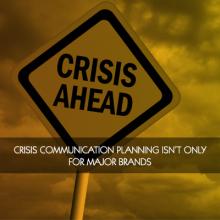Crisis communication planning isn’t only for major brands
 Here’s why even smaller businesses should have a plan to handle crisis communications.
Here’s why even smaller businesses should have a plan to handle crisis communications.
2017 has been awash in crises for brands like Pepsi, Adidas and United. All have made major missteps that became headline news.
While we may cringe when we hear these tales of corporate slipups, some good may come of it. It presents an opportunity to talk about how PR—specifically crisis communications– can help in times of trouble.
When you think about your business, can you anticipate a crisis that might arise? An inappropriate social media post or tweet. A mishandling of a situation with a customer. A public safety issue. And the list goes on. The truth is that anything can happen at any time. And with social media there to spread the bad news, it can quickly go viral.
If we can take any lessons from these situations, it’s that EVERY business really needs to have a plan in place in the event of a crisis.
If this were to happen to your business, would you be ready? The truth is that even small businesses need to think through to plan and prepare how they would respond should a crisis befall them. Lack of a timely response can make a bad situation worse.
To prepare, why not put together a plan that addresses at least the basics so that if a crisis occurs, you’re ready to hit the ground running to contain the damage before it spirals out of control? A basic crisis communications plan might include:
- Select a crisis team: This should include various departments across the company, such as management, communications, legal, HR, and operations. For smaller companies, this may be simple, as the owner assumes many of these responsibilities. This process can raise important points, for example, making sure you have an attorney you trust to call on.
- Designate a spokesperson: This is usually the CEO or owner of the business. In a larger company, it could be another C-level executive. If needed, you can name more than one spokesperson, such as one who can handle more complex questions requiring specifics the CEO may not be as well versed in. Remember, too, that it’s always a good idea to have a backup, just in case your top choice is traveling, ill or otherwise unavailable.
- Determine audiences: To be sure you have appropriate messaging ready, consider including your customers, employees, the news media, the community, partners and perhaps investors. The list can vary, depending on the type of business and the type of crisis.
- Establish media policy and procedures: Some common practices include having one point of contact (a person or a department) where all media calls related to the crisis are routed. Each call should be logged. Notes should be kept on how each contact was handled.
- Preparing for interviews: You should make sure to have your spokesperson practice answering tough questions. Prepare a Q&A that covers the most difficult questions and the answers you want to provide.
For example, once I worked on an agricultural event when swine flu was in the news. We prepared the spokesperson to address tough questions on the risk to the public, as we knew the media would ask.
And DON’T just “wing it”—you need practice. And it isn’t only the words you use but the tone. More on that here.
Keep in mind, this is a basic outline. If you’re ready to plan for what your organization will do in the event of a crisis, try following these steps to get the essentials in place. Or, call on a public relations expert to help you flesh out a plan to fit your needs.
Expert Office Hours
Your Questions • Our Experts
Private Appointments
9:00 am – 12:00 pm
2024
| Fri Aug 16 | Fri Oct 25 | Fri Dec 13 | Thu Sept 19 | Thu Nov 14 |
Register 2-3 weeks in advance
Have Expertise?
Subscribe to Our Updates!
Why New Albany?
As a community created by innovators for innovators, New Albany offers a robust ecosystem that leverages entrepreneurship, business connectivity, public-private partnerships and quality of life to inspire creativity and accelerate commerce.
